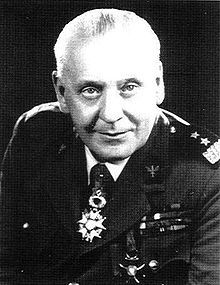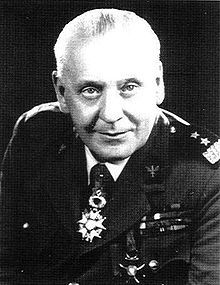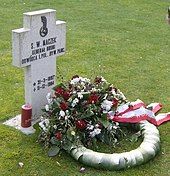Military Figure. Stanisław Władysław Maczek was a Polish tank commander of World War II, whose division was instrumental in the Allied liberation of France, closing the Falaise pocket, resulting in the destruction of 14 German Wehrmacht and SS divisions. A veteran of World War I, the Polish–Ukrainian and Polish–Soviet Wars, Maczek was the commander of Poland's only major armored formation during the September of 1939 campaign and later commanded a Polish armored formation in France in 1940. He was the commander of the famous 1st Polish Armored Division, and later of the I Polish Army Corps under Allied Command in 1942–45. He was born in the Lwów suburb of Szczerzec , which is now Ukrainian: Shchyrets, then in Austro-Hungarian Galicia. His father, Witold Maczek was a lawyer and his mother was Anna Czerny. His cousin was Vladko Maček, a Croatian politician. During his studies, he served in the Strzelec paramilitary organization, in which he received basic military training. After the outbreak of World War I, Maczek interrupted his studies, hoping to join Józef Piłsudski's Polish Legions, but instead was drafted into the Austro-Hungarian Army. After receiving a brief officer training, Maczek was sent to the Italian Front of World War I. Initially an NCO in the Tyrolean Regiment of the Imperial and Royal Army, he was promoted to second lieutenant in 1916 and then in 1918 to lieutenant. As the only Polish battalion commander in Austria-Hungary's Alpine regiments, Maczek gained experience in mountain warfare, which proved valuable in his later career. After the war he returned to the new Poland and joined the Polish Army and fought in the Polish-Ukranian War. By the end of the war, he had been promoted to the rank of Major. He then fought in the Polish-Bolshevik War, commanding 'flying' squad-type battalions. Before World War II, he continued with his officer training and served in a variety of commands, and was eventually promoted to Colonel. At the beginning of World War II, his brigade was hopelessly underequipped, however, faced the full might of the German invasion force for 5 days. When the Russians invaded Poland, they were forced to fall back into Hungary where they were interred. Maczek was not only esteemed by his superiors but also loved by his soldiers, who referred to him as Baca, a traditional Polish highlanders' name for a shepherd. They progressed to France in 1940 and re-formed the Polish Army, Maczek being promoted to Brigadier-General, to defend France from the invading Germans. When this failed, they escaped through Vichy France to North Africa, Portugal, and finally the UK. They again re-formed and trained over the next two years, in preparation for D-day, in the meantime, defending the Scottish coast. In 1944, during the Normandy campaign, they were transferred to Normandy and fought with the Canadians. They were involved in several battles, routing the retreating German divisions at Falaise and then pushing further into Germany via northern France, Belgium, and the Netherlands, freeing several cities including Breda which resulted in him being made an honorary Dutch citizen after the war. After the war, they returned to the UK where he was promoted to Major-General, and his unit was demobilized. With a Communist government now installed in Poland, he and other Poles who fought with the allies were stripped of their citizenship and exiled. Leaving the army in 1948, now stateless, he was denied a general's pension and had to work as a bartender in Edinburgh. Still, in this role, former Polish soldiers entering the bar would salute and stand to attention before their much-respected general. Eventually, the mayor of Breda successfully petitioned the Dutch government to provide him with an appropriate pension. Eventually, the last Polish Communist Prime Minister issued him an apology and he was awarded their highest state decoration, the Order of the White Eagle. When he died, he was buried with his soldiers in the Netherlands, as he had requested.
Military Figure. Stanisław Władysław Maczek was a Polish tank commander of World War II, whose division was instrumental in the Allied liberation of France, closing the Falaise pocket, resulting in the destruction of 14 German Wehrmacht and SS divisions. A veteran of World War I, the Polish–Ukrainian and Polish–Soviet Wars, Maczek was the commander of Poland's only major armored formation during the September of 1939 campaign and later commanded a Polish armored formation in France in 1940. He was the commander of the famous 1st Polish Armored Division, and later of the I Polish Army Corps under Allied Command in 1942–45. He was born in the Lwów suburb of Szczerzec , which is now Ukrainian: Shchyrets, then in Austro-Hungarian Galicia. His father, Witold Maczek was a lawyer and his mother was Anna Czerny. His cousin was Vladko Maček, a Croatian politician. During his studies, he served in the Strzelec paramilitary organization, in which he received basic military training. After the outbreak of World War I, Maczek interrupted his studies, hoping to join Józef Piłsudski's Polish Legions, but instead was drafted into the Austro-Hungarian Army. After receiving a brief officer training, Maczek was sent to the Italian Front of World War I. Initially an NCO in the Tyrolean Regiment of the Imperial and Royal Army, he was promoted to second lieutenant in 1916 and then in 1918 to lieutenant. As the only Polish battalion commander in Austria-Hungary's Alpine regiments, Maczek gained experience in mountain warfare, which proved valuable in his later career. After the war he returned to the new Poland and joined the Polish Army and fought in the Polish-Ukranian War. By the end of the war, he had been promoted to the rank of Major. He then fought in the Polish-Bolshevik War, commanding 'flying' squad-type battalions. Before World War II, he continued with his officer training and served in a variety of commands, and was eventually promoted to Colonel. At the beginning of World War II, his brigade was hopelessly underequipped, however, faced the full might of the German invasion force for 5 days. When the Russians invaded Poland, they were forced to fall back into Hungary where they were interred. Maczek was not only esteemed by his superiors but also loved by his soldiers, who referred to him as Baca, a traditional Polish highlanders' name for a shepherd. They progressed to France in 1940 and re-formed the Polish Army, Maczek being promoted to Brigadier-General, to defend France from the invading Germans. When this failed, they escaped through Vichy France to North Africa, Portugal, and finally the UK. They again re-formed and trained over the next two years, in preparation for D-day, in the meantime, defending the Scottish coast. In 1944, during the Normandy campaign, they were transferred to Normandy and fought with the Canadians. They were involved in several battles, routing the retreating German divisions at Falaise and then pushing further into Germany via northern France, Belgium, and the Netherlands, freeing several cities including Breda which resulted in him being made an honorary Dutch citizen after the war. After the war, they returned to the UK where he was promoted to Major-General, and his unit was demobilized. With a Communist government now installed in Poland, he and other Poles who fought with the allies were stripped of their citizenship and exiled. Leaving the army in 1948, now stateless, he was denied a general's pension and had to work as a bartender in Edinburgh. Still, in this role, former Polish soldiers entering the bar would salute and stand to attention before their much-respected general. Eventually, the mayor of Breda successfully petitioned the Dutch government to provide him with an appropriate pension. Eventually, the last Polish Communist Prime Minister issued him an apology and he was awarded their highest state decoration, the Order of the White Eagle. When he died, he was buried with his soldiers in the Netherlands, as he had requested.
Bio by: Howard Jones
Advertisement
See more Maczek memorials in:
Advertisement



